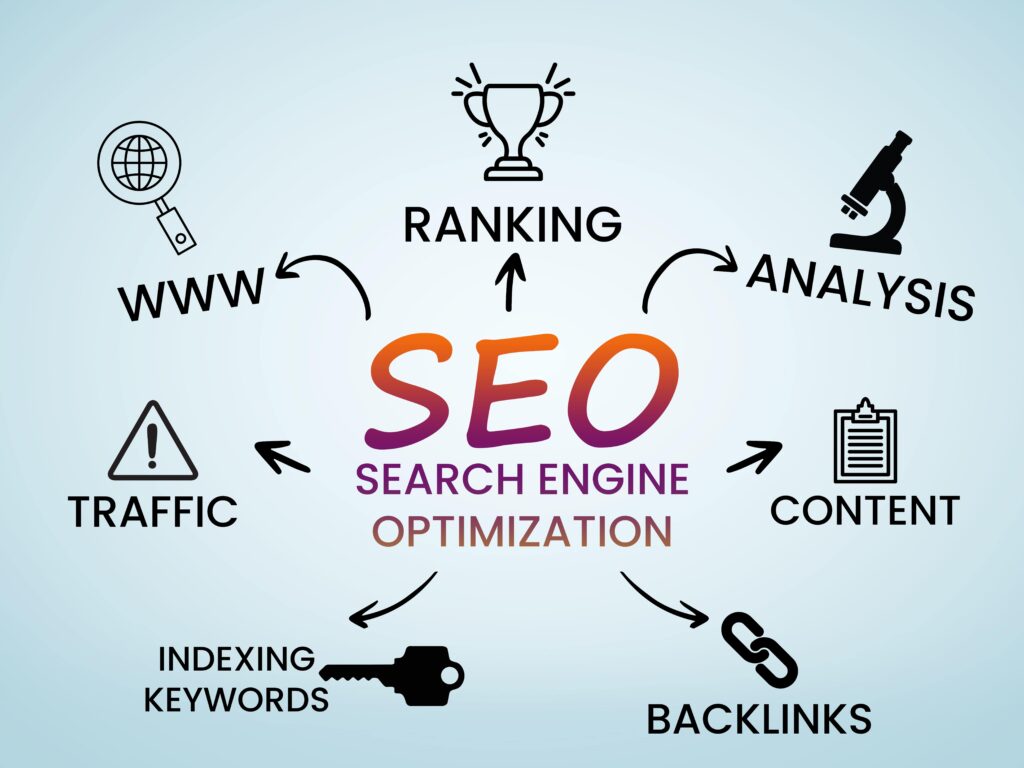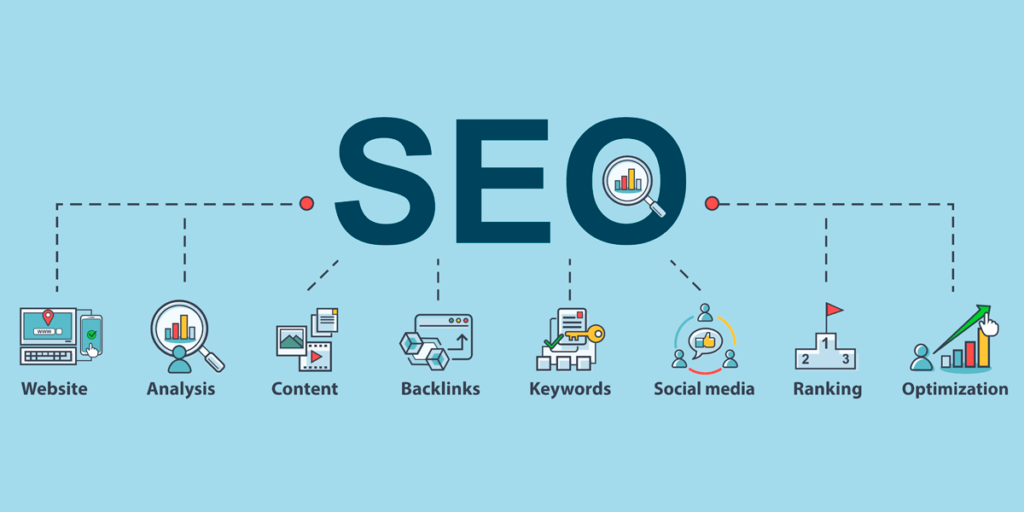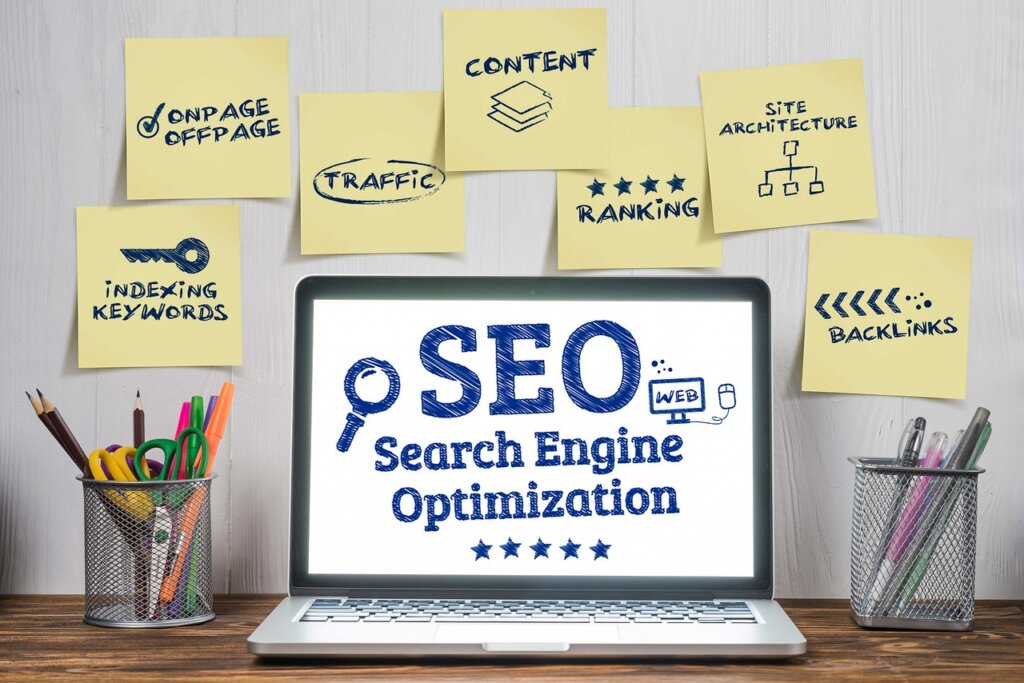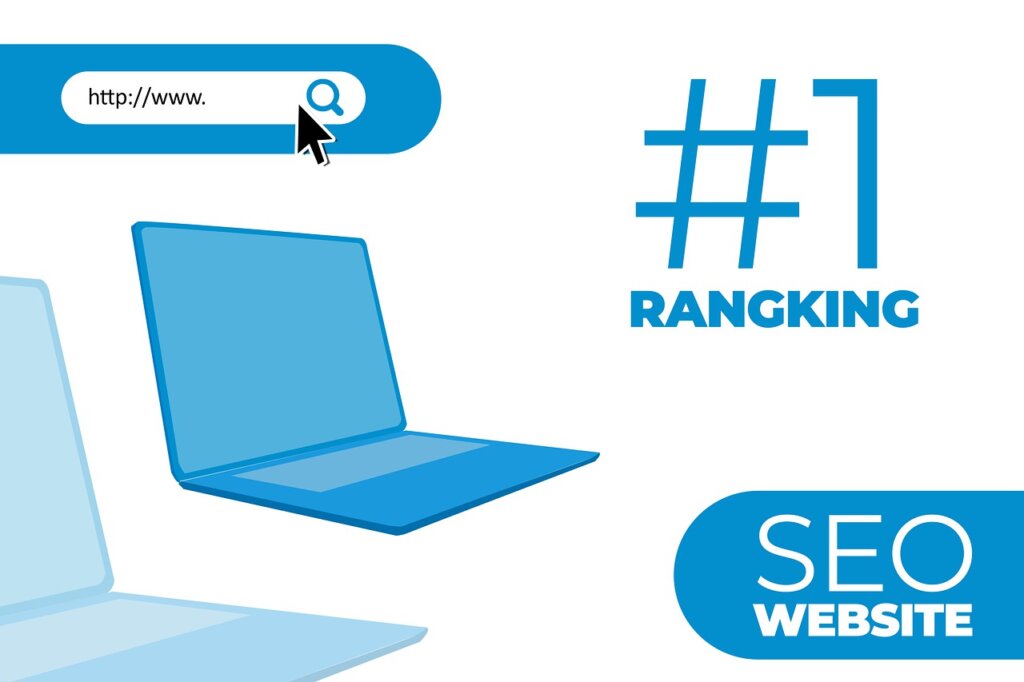
What is SEO?
SEO stands for Search Engine Optimization.SEO is all about improving the volume and quality of visitors to your website through unpaid (organic) search engine results. SEO involves various strategies and techniques aimed at making your website more visible to search engines like Google, Bing, and Yahoo.
Types of SEO process:
- On-Page SEO: This includes using appropriate keywords, creating high-quality content, optimizing meta tags, headers, and images, improving site speed, and ensuring mobile-friendliness.
- Off-Page SEO: Activities done outside of your website to improve its search engine rankings. This includes building backlinks (links from other websites to yours), social media marketing, influencer outreach, and other promotional methods.
- Technical SEO: Optimizing the technical aspects of your website to help search engines crawl and index it efficiently. This includes improving site structure, optimizing URL structure, fixing broken links, implementing schema markup, and improving site speed and performance.
- Local SEO: Optimizing your website to rank better for local audiences and searches, especially important for businesses that operate in specific geographic areas. This involves creating and optimizing Google My Business profiles, local directory listings, and obtaining reviews from customers.
- Content SEO: Creating high-quality, relevant content that attracts and engages your target audience. This can include blog posts, articles, videos, infographics, and other types of content that address the needs and interests of your audience while incorporating relevant keywords and search terms.
SEO is an ongoing process that requires monitoring, adjustments, and adaptation to changes in search engine algorithms and user behavior. When done effectively, SEO can help increase visibility, traffic, and ultimately conversions for your website or online business.
Achieving High Ranking in SEO :
- Relevance and Keywords:Relevance and Keywords: Ensuring your content aligns closely with the search intent of your target audience and strategically incorporating relevant keywords throughout your website and content to enhance visibility and attract organic traffic.
- Quality Content: Create high-quality, informative, and engaging content that resonates with your audience. Producing valuable, well-written, and relevant content that not only meets the needs of your target audience but also enhances your website’s authority and visibility in search engine results.
- User Experience: Provide a seamless and intuitive user experience on your website, including fast loading times and mobile-friendliness.User Experience in SEO: Focusing on creating a positive and seamless experience for visitors to your website, including easy navigation, fast loading times, mobile responsiveness, and intuitive design. Optimizing user experience can improve engagement metrics and contribute to higher search engine rankings.
- Technical Optimization: Optimize technical aspects like site structure, meta tags, and schema markup to improve search engine crawling and indexing.Enhancing the technical aspects of your website to ensure it is easily accessible and understandable by search engines. This includes optimizing site structure, improving page speed, implementing schema markup, and addressing crawlability and indexability issues. Effective technical optimization can positively impact your website’s visibility and rankings in search engine results pages (SERPs).
- *SEO Best Practices: Follow SEO guidelines, build authoritative backlinks, and regularly update and optimize your content to maintain and improve rankings over time.

SEO Benefits:
SEO (Search Engine Optimization) offers numerous benefits for websites and businesses:
- Increased Website Traffic: By improving your search engine rankings, SEO helps attract more organic (non-paid) traffic to your website.
- Cost-Effectiveness: Compared to paid advertising, SEO can be a cost-effective strategy in the long term, as organic traffic is free once you achieve high rankings.
- Improved Brand Visibility and Awareness: Higher rankings in search engines make your website more visible to potential customers, increasing brand recognition and trust.
- Higher Return on Investment (ROI): Effective SEO strategies can provide a high ROI by targeting users who are actively searching for products or services related to your business.
- Better User Experience: SEO involves optimizing your website for better usability, faster loading times, and mobile responsiveness, which enhances the overall user experience.
- Long-Term Results: While it may take time to see significant results, SEO efforts can provide long-lasting benefits and maintain your website’s visibility over time.
- Competitive Advantage: Ranking higher than your competitors in search results can give you a competitive edge, attracting more customers and increasing market share.
- Targeted Traffic: SEO allows you to target specific demographics, locations, or user behaviors, ensuring that your website reaches the most relevant audience for your business.
- Measurable Results: SEO efforts can be tracked and analyzed using tools like Google Analytics, providing insights into traffic sources, user behavior, and conversion rates.
- Synergy with Other Marketing Channels: SEO complements other digital marketing strategies, such as content marketing, social media marketing, and PPC advertising, amplifying their effectiveness.
Overall, investing in Search engine optimization can significantly impact your online presence, traffic, and business growth, making it a valuable strategy for long-term success in the digital landscape.

why keywords are important in SEO?
Keywords play a crucial role in SEO because they connect what people are searching for with the content on your website. Here’s why keywords are important:
- Relevance: Keywords help search engines understand the topic and relevance of your content to user queries. Using relevant keywords ensures that your website appears in search results when people search for related terms.
- Visibility: Optimizing your content with targeted keywords increases the likelihood of your website ranking higher in search engine results pages (SERPs), making it more visible to potential visitors.
- Traffic: Targeting the right keywords can attract more qualified traffic to your website. When your content aligns with what users are searching for, they are more likely to click through to your site.
- User Intent: Keywords reflect user intent, helping you understand what information or solutions your audience is seeking. By targeting specific keywords, you can address these needs effectively and improve user experience.
- Competitive Advantage: Effective keyword research and optimization can give you a competitive edge by identifying less competitive, yet relevant keywords that can still drive significant traffic to your site.
- Content Strategy: Keywords guide your content creation strategy. They help you structure and prioritize topics, ensuring that your content meets the needs of your target audience and aligns with your SEO goals.
- Measurable Results: Keywords are measurable. You can track rankings, traffic, and conversions associated with specific keywords, allowing you to refine your SEO strategy over time for better performance.
Overall, keywords are foundational to SEO as they bridge the gap between user queries and the content on your website, ultimately driving visibility, traffic, and conversions.

SEO is important for all website:
Absolutely! SEO (Search Engine Optimization) is crucial for all websites, regardless of their size, industry, or purpose. Here’s why:
- Visibility and Discovery: SEO helps your website get discovered by users who are actively searching for products, services, or information related to your business. Without SEO, your website may not rank well in search engine results pages (SERPs), making it harder for potential customers to find you.
- Cost-Effective Traffic: Organic search traffic generated through SEO is cost-effective because it doesn’t require ongoing payments for clicks or impressions, unlike paid advertising. Once your website ranks well, you can attract consistent traffic without additional costs.
- Credibility and Trust:Websites that appear prominently in search results are typically viewed as more reliable and dependable by users. By appearing prominently in search results, SEO helps build credibility and reinforces your brand’s authority in your industry.
- Competitive Advantage: In competitive markets, SEO can give you an edge over competitors who may not be investing in SEO or are not optimizing effectively. Ranking higher can attract more customers and increase market share.
- User Experience (UX): SEO involves optimizing various aspects of your website, such as speed, navigation, mobile-friendliness, and content quality. These optimizations improve user experience, reducing bounce rates and increasing engagement and conversions.
- Long-Term Strategy: SEO is a long-term strategy that can provide sustainable results over time. While it may take some time to see significant improvements, once established, your rankings can be maintained with ongoing optimization efforts.
- Analytics and Insights: SEO allows you to gather valuable data and insights about your website visitors, such as demographics, search behaviors, and preferences. This information can guide your marketing plans and improve your understanding of your audience.
- Integration with Other Marketing Channels: SEO complements other digital marketing channels, such as content marketing, social media marketing, and email marketing. It amplifies the effectiveness of these efforts by driving traffic to your website.
In summary, Search engine optimization is essential for all websites because it enhances visibility, drives traffic, builds credibility, improves user experience, and provides valuable insights for ongoing optimization and growth. It’s a fundamental component of digital marketing that can significantly impact your online success and business growth.
SEO Strategies for Boosting Your Online Visibility:
SEO strategies for boosting your online visibility typically involve:
- Keyword Research and Optimization: Identify relevant keywords that your target audience is searching for and strategically incorporate them into your website content, meta tags, and headings.
- Content Creation and Optimization: Develop high-quality, informative content that addresses the needs and interests of your audience. Optimize your content with targeted keywords, clear structure, and engaging multimedia elements.
- On-Page SEO: Optimize individual web pages by improving meta tags (title tags, meta descriptions), headings (H1, H2, etc.), URL structure, and internal linking to enhance search engine rankings.
- Technical SEO: Ensure your website is technically optimized for search engines. This includes improving site speed, mobile responsiveness, fixing crawl errors, implementing schema markup, and optimizing robots.txt and XML sitemaps.
- Off-Page SEO: Build high-quality backlinks from reputable websites to increase your site’s authority and improve rankings. Engage in social media marketing, influencer outreach, and guest blogging to amplify your online presence.
- Local SEO: If applicable, optimize your website for local searches by creating and optimizing Google My Business listings, obtaining local citations, and encouraging customer reviews.
7.User Experience (UX) Optimization: Enhance user experience by ensuring your website is easy to navigate, loads quickly, and provides valuable content that keeps visitors engaged and encourages them to stay longer on your site.
8.Analytics and Monitoring: Regularly monitor your SEO performance using tools like Google Analytics and Google Search Console. Analyze key metrics such as traffic sources, keyword rankings, and user behavior to identify opportunities for improvement.
- Long-Tail Keywords: Targeting long-tail keywords (phrases with three or more words) that are specific to your niche can attract highly targeted traffic with less competition.
- Voice Search Optimization: With the rise of voice assistants like Siri and Alexa, optimizing your content for voice search queries can help capture traffic from users who perform searches using natural language.
- Content Freshness: Updating and adding new content regularly shows search engines that your website is active and relevant. This can improve your rankings and attract return visitors.
- Optimized Images and Videos: Use descriptive filenames, alt text, and captions for images and videos to improve visibility in image and video search results, as well as enhance overall user experience.
- Social Media Integration: Sharing your content on social media platforms not only increases visibility but can also generate backlinks and social signals that contribute to Search engine optimization.
- Local Listings and Reviews: Optimizing your presence on local directories and encouraging customer reviews can improve your local SEO rankings, especially for businesses targeting a specific geographic area.
- Structured Data Markup: Implementing structured data (schema markup) can enhance how your content appears in search results by providing additional context to search engines.
- Link Building: Focus on building high-quality backlinks from authoritative websites in your industry. Natural and relevant backlinks can significantly impact your search engine rankings.
- Mobile Optimization: With the increasing use of mobile devices, ensure your website is fully optimized for mobile users, including responsive design and fast loading times.
- E-A-T (Expertise, Authoritativeness, Trustworthiness): Google values websites that demonstrate expertise, authoritativeness, and trustworthiness in their content. Establishing your website as a credible source can improve rankings.
- User-Generated Content: Encouraging user-generated content such as reviews, testimonials, and comments can enhance engagement and provide fresh content for search engines to index.
- SEO Audits and Regular Updates: Conduct regular Search engine optimization audits to identify and fix issues that may affect your rankings. Keep up-to-date with Search engine optimization trends and algorithm changes to adapt your strategy accordingly.
By incorporating these advanced SEO strategies into your digital marketing efforts, you can enhance your online visibility, attract more organic traffic, and achieve long-term success in search engine rankings.

Avoid these SEO pitfalls:
By avoiding these SEO pitfalls and focusing on providing valuable content, optimizing for user experience, and adhering to SEO best practices, you can improve your website’s visibility and rankings in search engine results pages (SERPs).
Certainly! Here are the SEO “nots” with more details on each:
1.Keyword Stuffing:
- Detail: Refers to the practice of excessively using keywords or phrases in an unnatural manner within your content, meta tags, or URLs.
- Impact: Can lead to a poor user experience and may result in search engines penalizing your site for trying to manipulate rankings.
2 . Duplicate Content:
- Detail: Occurs when identical or very similar content appears on multiple pages of your website or across different domains.
- Impact: Search engines may have difficulty determining which version to rank, potentially resulting in lower rankings or penalties.
3. Cloaking:
- Detail: Involves presenting different content or URLs to search engines and users, often done to deceive search engines.
- Impact: Violates search engine guidelines and can lead to severe penalties, including removal from search engine indexes.
4 . Buying Links or Engaging in Link Schemes:
- Detail: Involves purchasing links from other sites or participating in schemes to manipulate the number of backlinks pointing to your site.
- Impact: While backlinks are important for SEO, unnatural links can lead to penalties from search engines and may harm your site’s reputation.
5 . Ignoring Mobile Optimization:
- Detail: Failing to optimize your website for mobile devices, resulting in a poor user experience on smartphones and tablets.
- Impact: With a significant portion of internet traffic coming from mobile devices, poor mobile optimization can lead to higher bounce rates and lower rankings in mobile search results.
6 . Neglecting Page Load Speed:
- Detail: Refers to slow loading times for your website pages, which can be caused by large images, excessive scripts, or poor server performance.
- Impact: Slow loading speeds frustrate users and can lead to higher bounce rates. Google also considers page speed as a ranking factor, so faster-loading pages may rank higher in search results.

Instruments to Elevate Your SEO( Search engine optimization Strategy)
Here are the top 5 essential tools to enhance your Search engine optimization efforts:
Google Analytics: Provides comprehensive insights into your website traffic, user behavior, conversions, and more. It helps you track the effectiveness of your Search engine optimization strategies and optimize accordingly.
Google Search Console: Monitors your website’s performance in Google search results, identifies indexing issues, and provides valuable data on search queries, impressions, and clicks.
SEMrush: Offers a suite of Search engine optimization tools including keyword research, competitor analysis, backlink analysis, and site auditing. It helps you identify opportunities for improvement and track your Search engine optimization progress.
Ahrefs: Provides robust backlink analysis, keyword research, and competitor analysis tools. It helps you analyze your backlink profile, find new keyword opportunities, and monitor your competitors’ Search engine optimization strategies.
Yoast SEO (for WordPress): A powerful plugin that helps optimize your WordPress site for SEO. It offers real-time content analysis, XML sitemap generation, meta tag optimization, and more to improve on-page Search engine optimization factors.
Conclusion for Search engine optimization:
Search engine optimization is crucial for improving a website’s visibility on search engines like Google. It involves optimizing content, keywords, and technical aspects to boost rankings in search results. By focusing on user experience and continuous optimization, businesses can attract more organic traffic, enhance brand visibility, and achieve long-term growth online.Ultimately, investing in Search engine optimization as part of a comprehensive digital marketing strategy can lead to increased brand visibility, higher traffic volumes, and greater conversions, contributing to long-term business growth and success.

